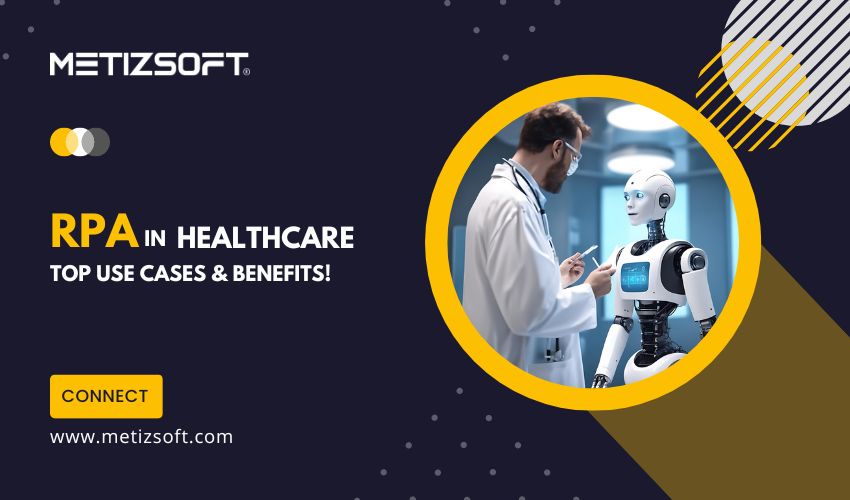
In a rapidly multiplying digital era, one industry that genuinely deserves to be completely automated is none other than the healthcare industry. From patient scheduling to processing claims payment, every healthcare service desk agent often encounters an overhaul of tasks 24*7.
The everyday healthcare operations and workflow make their work challenging. Moreover, when the patient volume is high, they find it more daunting to handle multiple tasks simultaneously. As a result, offering quick and efficient solutions to each patient becomes more challenging.
It’s not like the healthcare industry hasn’t undergone any digital transformation. Over the years, they did, but couldn’t adapt to their true potential. However, the introduction and implementation of Robotic Process Automation (RPA) have become a game-changing solution for them.
In this blog, we will review the role of RPA in the healthcare industry. We will discuss the benefits it brings, the challenges it poses, and real-time use cases.
Table of Contents
RPA in Healthcare – Overview!
The healthcare business runs in real-time. Many tasks are done manually, including:
- Staffing
- Patient On/offboarding
- Data management
- Administrative duties
- Payments
- Record keeping
- Claims management
Since these processes rely on human intervention, they are prone to errors, limit productivity, and lead to many operational inefficiencies. This can result in poor patient experiences, short staffing, overworked employees, slower processes, and high operating costs.
RPA technology and automation tools can play a significant role in providing value-based care in the healthcare sector. The use of RPA in healthcare can automate repetitive processes, such as patient registration and data verification. This can help healthcare professionals save time and utilize their expertise to provide better patient care.
Ways RPA Benefits the Healthcare Industry!
RPA has significant benefits. It is faster, more efficient, and less error-prone. This leads to the simplification of workflows and eliminates redundancy in the healthcare industry.
Enabling RPA in healthcare can:
Personalize Patient Experience – Implementing RPA in your healthcare systems means the end of repetitive or mundane tasks for your staff. The bots are now there to handle the system-related tasks.
They can now do more viable tasks like meeting patients face-to-face, looking after their supplies, and guiding their families or loved ones. This way, RPA can help you enhance patient interaction and make them feel valuable during their stay in your facility.
Boost Productivity – By implementing RPA, healthcare staff can focus on complex business areas by automating tedious and repetitive activities. While manual tasks are no longer their concern, they are now up for more activities in less time.
Improve Accuracy – Healthcare organizations can ensure greater accuracy and consistency across data collection, reporting, and tasks by eliminating error-prone, manual tasks.
Regulatory Compliance – Data handling and reporting using RPA bots optimizes processes and ensures compliance with regulations for sensitive patient information.
Reduce Cost – When bots and software are in place doing most of the tasks, it’s a win-win situation for any organization. With less human intervention, RPA technology automates labor-intensive activities to save time, resources, and money.
Improve Interoperability – Healthcare organizations can use RPA to seamlessly exchange data between previously isolated electronic medical records (EMRs) and electronic health records (EHRs), resulting in higher patient care and satisfaction.
Now that we have highlighted the benefits of RPA in healthcare let’s explore a few challenges it poses in the same industry.
Challenges of RPA in Healthcare!
Implementing Robotic Process Automation (RPA) in the healthcare industry offers enormous potential and unique challenges. Managing the intricacies of the healthcare sector requires careful consideration despite its promise to streamline workflows and increase efficiency.
Here are some primary challenges of RPA in healthcare:
High-volume Data Processing – Decoding and processing data manually or using various tools can be challenging and time-consuming. Furthermore, storing patient data in outdated systems and granting access to healthcare professionals can be complex.
Cyber Security – Healthcare data is vulnerable to being leaked or stolen. In the US market alone, more than 13 million healthcare or patient records are stolen and sold yearly. Most of these incidents involve human errors in the security chain. Therefore, data privacy and confidentiality are among the most significant concerns for any healthcare organization.
Staff Resistance – “RPA will replace humans at workstations.”
It is a common misconception that needs clarification. Healthcare management here must communicate with employees that robotic process automation (RPA) is to assist them, not replace them. Proper training can help employees better understand the technology, acquire new skills, and use RPA more efficiently.
Post-deployment Issues – It is high time for healthcare providers to appoint a dedicated person as the owner of the RPA solution to perform maintenance tasks such as monitoring bot operations, making adjustments, running endurance testing, and more.
Top RPA Use Cases in the Healthcare Industry!
RPA technology automates various tasks in healthcare organizations, including front-office tasks, record management, billing, and processing. Here are some common RPA use cases in the healthcare industry:
Appointment Scheduling – Automating appointment scheduling tasks can reduce errors and make the process less cumbersome. RPA bot can suggest available time slots and relevant doctors based on the patient’s request, clinic location, and doctors’ availability.
It can also estimate the appointment duration and remove the slot if the patient cancels. Additionally, the bot notifies the patient and the doctor of any changes or updates regarding the appointment.
Claim Management – Healthcare organizations process high volumes of claims manually, which can be repetitive and time-consuming. RPA automates the process using rules-based decision-making, eliminating errors and ensuring regulatory compliance.
Payment & Billing – Healthcare providers have to manage various bills and payments, including costs for doctor visits, medical tests, medications, hospital stays, and more.
RPA bots can streamline the billing process by automatically creating invoices based on patient services. This speeds up billing, makes pricing transparent, and prevents errors.
Administrative Data Entry – Administrative data entry is prone to manual errors. However, with RPA, data inputs can be collected from various sources, converted into structured data, and input into a database.
Staff Management – Hospitals face a complex daily challenge in maintaining appropriate staffing levels. They need to ensure that their employees are well-rested and energized. At the same time, they need to manage their budget effectively.
One way to address this challenge is by using RPA. Hospital administrators can use software bots to coordinate schedules, manage attendance, and monitor employee performance across multiple systems. These bots can synchronize data across all staff-related systems, including performance, payroll, FTE, and other metrics.
Compliance Management – Robotics Process Automation (RPA) can help conduct compliance audits. The actions a bot performs are recorded meticulously, ensuring transparency for auditors and generating structured data for further analysis.
Additionally, RPA bots can be programmed to generate reports automatically and route them to the appropriate managers and departments.
Post-discharge Management – Patients must fill prescriptions and follow instructions after discharge. Ensuring patients adhere to post-discharge guidelines is crucial but can be challenging for healthcare providers.
RPA robots can ensure compliance with discharge guidelines and remind patients about appointments and prescription pick-ups, improving HCAHPS scores and overall patient experience.
Data Analytics – Healthcare organizations increasingly use Robotic Process Automation (RPA) tools to streamline their internal research processes.
By programming bots to input patient data and prepare it for analysis, healthcare professionals can make more accurate diagnoses and offer individualized treatment for each patient.
With vast amounts of valuable data available, using RPA tools has become essential to the healthcare industry’s efforts to improve patient outcomes.
Record Management – Healthcare providers should maintain clear and accessible records of returning patients’ previous visits and treatments to ensure consistency in medical aid. However, those days of manual data searching through multiple registers or Excel sheets no longer exist. It is both hectic and time-consuming.
RPA tools can capture and save patient data from registration, allowing hospital staff to access and extract necessary information quickly.
Insurance Document Automation – Healthcare insurance paperwork is streamlined using RPA technology for document extraction, validation, generation, and processing. This results in boosting efficiency, reducing errors, and compliance assurance.
Implement RPA in Your Healthcare Operation Today!
The healthcare industry post-RPA implementation has witnessed remarkable changes, from growing technology adoption to changes in patient preferences, demand for accessible data accessibility, and much more.
As per Factme.com reports, global healthcare automation currently stands at a valuation of US$38.6 billion. It possibly can grow at 9.3% CAGR in 2033 to reach US$94 billion by the end of 2033.
If you run a healthcare industry and are looking for a streamlined automation solution, RPA is your all-in-one answer. Don’t wait for others’ results to make a decision. Implement RPA in your healthcare system today to be an example for others. Hire RPA experts to enable and experience the magic of advanced automation.
AboutManthan Bhavsar
Related Posts
Top RPA Use Cases and Benefits for Every Businesses in 2024
Robotic Process Automation (RPA) is revolutionizing industries of all sizes and niches by automating repetitive and rule-based...
RPA in Healthcare – Role, Use Cases, Challenges and Benefits!
In a rapidly multiplying digital era, one industry that genuinely deserves to be completely automated is none other than the...

